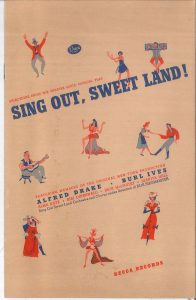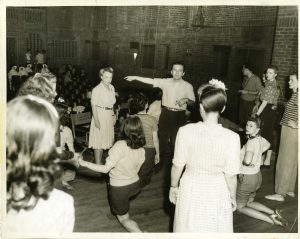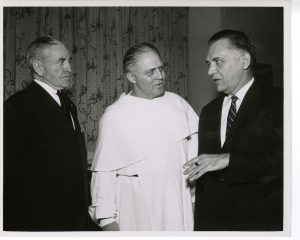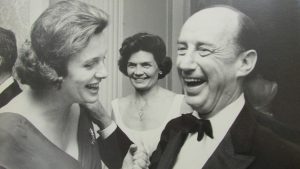
This week’s Archivist’s Nook is by Morgan McKeon, graduate student in the Department of Library and Information Science.
Walter and Jean Kerr, partners in life and art, were figures of the dramatic arts from Catholic University to Broadway. Their work spanned from the stage to the televisions of the American public. Together, Walter and Jean Kerr had a fruitful artistic and familial partnership. Their first collaboration in 1942, the musical comedy “Count Me In,” opened at Catholic University and was produced in New York in 1942. Their Catholic University musical, “Sing Out, Sweet Land,” was brought to Broadway in 1944. 1946 saw their Broadway debut as a team with “Song of Bernadette.”

Walter Kerr became a professor of speech and drama at Catholic University in 1939 after it was founded by Father Gilbert Hartke in 1937. Alongside Hartke, Kerr helped develop the department and supported it through his direction of stage productions as well as writing original works to be performed at the university. By Spring of 1939 Kerr “wrote and directed his first production at the university, a one-act play entitled Hyacinth on Wheels.”¹ While popular among the students, Kerr decided to move on from academia in 1951. Walter Kerr continued to write and direct works for the stage – he also turned his attention to criticism. For his work as a critic, he would win a Pulitzer Prize in 1978. In 1966 he became the chief drama critic for the New York Times. Though hired as the soul critic, Kerr made the decision to only write for the Sunday edition so that he would not be the only opinion. “I saw in advance that the power of the Times, with one man writing both daily and Sunday, would be absolute. I wanted the vote split, and the Times was quick to agree.”² Due to his writing style, he made the theatre accessible to a wide audience – Newsweek even deemed him a “supercritic”.³ Though he was an influential critic, Kerr was not without those who criticized his reviews. In 1965 The Village Voice “presented him with an award for his ‘outstanding disservice to the modern theatre.’”⁴ During his career, Kerr was often critical of work that he though too musically ambitious or overrun with pretension. Despite some critics, Kerr won a Pulitzer Prize in 1978 for his criticism, was inducted into the Theatre Hall of Fame in 1983, and was honored in 1990 when Manhattan’s restored Ritz Theatre was renamed the Walter Kerr Theatre.

Jean Kerr, was successful in her own right. Her theatrical works and publications were admired for their humor and “unerring eye for life’s everyday absurdities.” She won a Tony Award in 1961 for King of Hearts – but it was Please, Don’t Eat the Daisies that brought her into popular culture. Published in 1957, this collection of essays (based on her life as a mother and wife to an important critic) became a best-seller. It was adapted into a film in 1960 and made into a short-lived television series in 1965. In 1973, Jean Kerr won The National Institute of Social Sciences Gold Medal Award for distinguished service to humanity.
It was not until the processing of this collection that I learned about the contributions of the Kerr’s. The Walter and Jean Kerr Collection is made up largely of awards received by Walter and Jean. The Catholic University of America continues to live the legacy of Father Hartke, Walter and Jean Kerr – as well as the others that were central to the development of the Drama department. Their collection provides an important element to the holdings at Catholic University – providing another look at important figures that found themselves in Brookland. The Kerr’s found in themselves and through each other the desire to create for and support the theatrical arts. With every new production, Walter and Jean Kerr live on both at the Catholic University of America and the Broadway stage.

The Walter and Jean Kerr Collection can be viewed here: http://archives.lib.cua.edu/findingaid/kerr.cfm
¹Mary Jo Santo Pietro, Father Hartke: His Life and Legacy to the American Theatre (Washington: The Catholic University Press, 2002), 70.
²Roderick Bladel, Walter Kerr: An Analysis of His Criticism (Metuchen, N.J.: The Scarecrow Press, Inc., 1976), 1.
³Bladel, 1.
⁴Bladel, 2.
